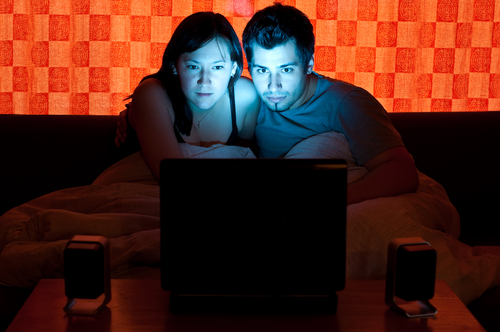Studies show that warm tinted glasses at night may help you go to sleep faster.
As we get further and further into the winter months, the sun begins to rise later and set earlier in the day, making it harder and harder to maintain a regular sleep schedule. Each morning it becomes more difficult to get up when it is pitch dark outside, and with the sun disappearing as early as 5pm in some cities around the country, there is no clear signal for your brain that it is time to go to sleep at night.
Combine this with the fact that we are around bright florescent lights that shock our eyes in our offices and at home during all of these dark hours of the day, and it is no wonder that we have a hard time falling asleep at night and getting up in the morning. Plus, researchers have also discovered that prolonged contact with florescent light, along with the blue light that is emitted from your computer and television screens, can severely suppress melatonin secretion in your body, which affects the sleep-wake cycle in humans.
However, researchers have discovered that wearing amber or orange tinted glasses an hour before bed time may actually help you go to sleep earlier, faster and more consistently each night.

Orange Glasses Encourage Melatonin Production
In order to first understand how orange glasses encourage you to sleep better at night, you must first understand how too much melatonin can disrupt your body’s ability to fall asleep. Melatonin is a hormone found in the brain that helps your body know when it is time to go to sleep. For instance, when it is dark outside, the melatonin signals to the body that it is time to go to sleep, and when it is light, the production of melatonin is reduced and your body knows that it is time to wake up.
However, blue tinted light, typically emitted from electronic devices such as computers, laptops, cell phones and TVs, can slow down the production of melatonin in our brain and make it harder for us to fall asleep when it is bedtime.
Luckily, research has found that wearing orange or amber tinted glasses in the hours leading up to bedtime can allow you to block out the blue light that is produced by these devices and, in turn, help you fall asleep easily.
Tint The Color Of Your Electronics
While orange tinted glasses are a great way to block the blue light coming in from your electronic devices, why not just tint your devices themselves? A new program called f.lux does just that―it adjusts the color of your computer’s display depending on the time of the day. For instance, your computer display will use warm colors during the night hours so you can fall asleep, and bright colors during the day. No matter what time of the day it is, f.lux makes your computer screen look like the room you’re in all the time.
What do you think about your electronics affecting how you sleep at night? Do you find that the later you are watching TV or on the computer, the harder it is for you to fall asleep? Let us know in the comments below!
Information: Source